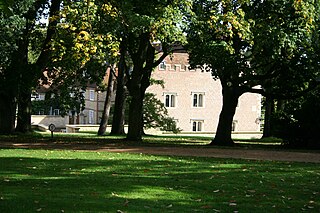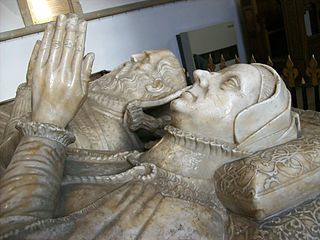Norreys (also spelt Norris) may refer to various members of, or estates belonging to, a landed family chiefly seated in the English counties of Berkshire and Lancashire and the Irish county of Cork.

Earl of Abingdon is a title in the Peerage of England. It was created on 30 November 1682 for James Bertie, 5th Baron Norreys of Rycote. He was the eldest son of Montagu Bertie, 2nd Earl of Lindsey by his second marriage to Bridget, 4th Baroness Norreys de Rycote, and the younger half-brother of Robert Bertie, 3rd Earl of Lindsey. His mother's family descended from Sir Henry Norris, who represented Berkshire and Oxfordshire in the House of Commons and served as Ambassador to France. In 1572 he was summoned by writ to Parliament as Lord Norreys de Rycote. He was succeeded by his grandson, the second Baron. In 1621, he created Viscount Thame and Earl of Berkshire in the Peerage of England. He had no sons and on his death in 1624 the viscountcy and earldom became extinct. He was succeeded in the barony by his daughter Elizabeth, the third holder of the title. On her death, the title passed to her daughter, the aforementioned Bridget, the fourth Baroness, and second wife of the second Earl of Lindsey.

Yattendon is a village and civil parish 7 miles (11 km) northeast of Newbury in the county of Berkshire, England. The M4 motorway passes through the fields of the village which lie 0.5 miles (800 m) south and below the elevations of its cluster. The village is privately owned and is "part of the 9,000 acre estate owned by the Iliffes, former press barons", part of the Yattendon Group.

Henry Norris, 1st Baron Norreys of Rycote in Oxfordshire, was an English politician and diplomat, who belonged to an old Berkshire family, many members of which had held positions at the English court.
Henry Norris was an English courtier who was Groom of the Stool in the privy chamber of King Henry VIII. While a close servant of the King, he also supported the faction in court led by Queen Anne Boleyn, and when Anne fell out of favour, he was among those accused of treason and adultery with her. He was found guilty and executed, together with the Queen's brother, George Boleyn, Sir Francis Weston, William Brereton and Mark Smeaton. Most historical authorities argue that the accusations were untrue and part of a plot to get rid of Anne.
Sir Edward Norreys was a 16th-century Governor of Ostend and English Member of Parliament.
Yattendon Castle was a fortified manor house located in the civil parish of Yattendon, in the hundred of Faircross, in the English county of Berkshire.
Sir John Norreys or Norris was a gentleman usher daily waiter at the English court during the reign of the House of Tudor. He is thought to be the author of a treatise describing the roles of servants of the chamber.
Sir John Norreys was a high ranking Lancastrian, and the head of the branch of the Norreys family who became prominent under the reign of the House of Tudor. He served as Keeper of the Wardrobe for King Henry VI of England.
Lady Alice Norreys was an English Lady of the Most Noble Order of the Garter.
Sir William Norreys was a famous Lancastrian soldier, and later an Esquire of the Body to King Edward IV.
Sir Thomas Norris (1556–1599) was an English soldier. He sat in the Irish House of Commons, and was made Lord President of Munster in Ireland. His last name is sometimes spelt Norreys.
Mary Fiennes (1495–1531) was an English courtier. She was the wife of Henry Norris. Norris was executed for treason as one of the alleged lovers of her cousin, Anne Boleyn, the second wife of King Henry VIII of England. Mary lived for six years at the French court as a Maid of Honour to queens consort Mary Tudor, wife of Louis XII; and Claude of France, wife of Francis I.
Bridget Norris, Countess of Berkshire was an English noblewoman, the daughter of Edward de Vere, 17th Earl of Oxford. Bridget was brought up by her maternal grandfather, the powerful statesman William Cecil, 1st Baron Burghley. She was also styled Lady Norris of Rycote and Viscountess Thame. She married Francis Norris, 1st Earl of Berkshire; however, the marriage was not a success, and they separated in 1606.

Francis Norris, 1st Earl of Berkshire was an English nobleman and courtier.

Rycote is a hamlet 2.5 miles (4.0 km) southwest of Thame in Oxfordshire. The Oxfordshire Way long-distance path passes through.

Rycote House the manor of Rycote, Oxfordshire, England, was a Tudor country house. First built in the early 16th century, the present site was rebuilt in the 1920s.
Sir William Norreys was an English soldier and courtier of the Tudor period.

John Williams, 1st Baron Williams of Thame was Master of the Jewels and Lord President of the Council of the Welsh Marches. He was summoned to parliament as Lord Williams of Thame on 17 February 1554.
Sir Henry Norris (1554–1599) was an English soldier and politician during the Tudor period.
John Norreys may refer to: